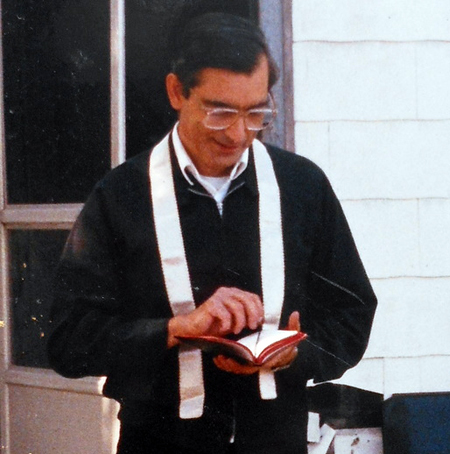
Emmanuel M. Carreira, S.J.
It might seem rather daring to add to this beautiful Prologue any other comment, no matter how well founded it might be. But the reality of the Incarnation leads us to insist on the fact that the Son-made-Man always appears and acts clearly expressing the double message of his Sonship and his role as manifestation of the Father, as the Word of Truth. As Son, He always seeks the intimate closeness of a bosom where He finds the environment of total love and of perfect happiness. If He has been eternally in the Father's bosom, in a total sharing of the divine nature, his coming into the world happens in Mary's bosom where she gives Him human existence in the motherly environment where a son constantly finds the perfect love that enjoys the most generous and total self-giving. Even at an infinitely lower level, Mary continues providing the intimate closeness found in the Trinity, in so far as a creature can reflect the life of God himself.
In an analogous sense -but a real one, even in its material meaning-we could also say that the natural tendency of a son to seek a welcoming bosom is the reason why we can give Christ our embrace in the Eucharist. He wants that perfect closeness, repeatedly found in each Holy Communion, where a mysterious sharing of life takes place that bridges -in so far as this is possible- any gap between God and each human person. If in the Trinity we adore a single divine nature that renders absurd any distance between the divine Persons, in the Eucharistic communion there is a communication of vital activity that allows us to say with St. Paul: "I live, but not I; it is Christ who lives in me". As a consequence of this union, time and again, the intimate embrace must lead to a kind of personal "transparency" that makes my activity not just mine, but simultaneously the activity of Christ and one of his members. Thus we can state as the only norm for holiness that human behaviour must be so closely identified with that of Christ that it can be attributed without irreverence to the Son of God who is the essential sanctity.
Avoiding any kind of rhetorical hair-splitting, we might also find in the personal identity of the Son -the expressive Word of the Father- a reasonable basis to appreciate Christ's insistence upon our true and correct way of speaking. We must answer YES or NO, and whatever goes beyond this simple statement of truth is attributed to the devil. We must render account "even of a useless word", and to use our speech to offend anybody is - in the new Law of Love-tantamount to the bodily injury that is forbidden by the fifth commandment. Christ's own work must be continued by the Church under the guidance of the Spirit of Truth, and the Apostles are chosen to go to the whole world to announce the Gospel. The Word must continue to sound from human lips just as it did with divine clarity in Christ's preaching, without any kind of abstract distortions or changes to make it more palatable to new cultures, places or times, at the cost of diminishing its power and its eternal treasure of absolute Truth.
It is also the word of the proper minister the one that confers the grace of each sacrament, even if other signs can make it -to some extent- also visible. Christ lives in his Church, and the communication of divine life through the sacraments makes us grow in the motherly bosom of our Holy Mother Church that gives new children in the Son to the only eternal Father. We are not speaking of a merely human institution of social togetherness or even of charitable works, but of a true source of life that has its only origin in Christ. With the most profound human meaning, the activity that makes us grow in Christ must be the proper work of his Mother Mary: if Christ found his human happiness in the world in the bosom of the Mother that was called "Full of Grace", He cannot but also want her continued loving help to make us develop as her children with Him. Mary is never an obstacle or a screen that hides Christ, just the opposite: in her the Word became visible and was given to us in a way that appeals to our mind and our heart. Mary must help us most specially to receive in our bosom, in each Communion, the Son who happily grew next to her motherly heart.
Top of Page
Back to Emmanuel M. Carreira, S.J. essays
Back to Cleveland Catholics | 
